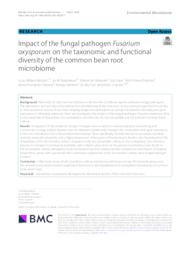Impact of the fungal pathogen Fusarium oxysporum on the taxonomic and functional diversity of the common bean root microbiome.
Impact of the fungal pathogen Fusarium oxysporum on the taxonomic and functional diversity of the common bean root microbiome.
Author(s): MENDES, L. W.; RAAIJMAKERS, J. M.; HOLLANDER, M. de; SEPO, E.; EXPÓSITO, R. G.; CHIORATO, A. F.; MENDES, R.; TSAI, S. M.; CARRIÓN, V. J.
Summary: Abstract: Background - Plants rely on their root microbiome as the first line of defense against soil-borne fungal pathogens. The abundance and activities of beneficial root microbial taxa at the time prior to and during fungal infection are key to their protective success. If and how invading fungal root pathogens can disrupt microbiome assembly and gene expression is still largely unknown. Here, we investigated the impact of the fungal pathogen Fusarium oxysporum (fox) on the assembly of rhizosphere and endosphere microbiomes of a fox-susceptible and fox-resistant common bean cultivar. -- Results: Integration of 16S-amplicon, shotgun metagenome as well as metatranscriptome sequencing with community ecology analysis showed that fox infections significantly changed the composition and gene expression of the root microbiome in a cultivar-dependent manner. More specifically, fox infection led to increased microbial diversity, network complexity, and a higher proportion of the genera Flavobacterium, Bacillus, and Dyadobacter in the rhizosphere of the fox-resistant cultivar compared to the fox-susceptible cultivar. In the endosphere, root infection also led to changes in community assembly, with a higher abundance of the genera Sinorhizobium and Ensifer in the fox-resistant cultivar. Metagenome and metatranscriptome analyses further revealed the enrichment of terpene biosynthesis genes with a potential role in pathogen suppression in the fox-resistant cultivar upon fungal pathogen invasion.
Publication year: 2023
Types of publication: Journal article
Unit: Embrapa Environment
Observation
Some of Embrapa's publications are published as ePub files. To read them, use or download one of the following free software options to your computer or mobile device. Android: Google Play Books; IOS: iBooks; Windows and Linux: Calibre.
Access other publications
Access the Agricultural Research Database (BDPA) to consult Embrapa's full library collection and records.
Visit Embrapa Bookstore to purchase books and other publications sold by Embrapa.

